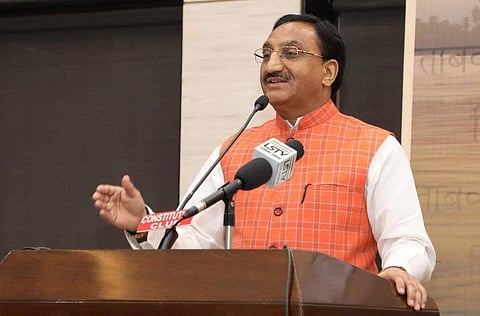

A virtual meeting of G20 Education Ministers was held on Saturday to discuss and share experiences of member countries in the three identified areas of education continuity in times of crises, early childhood education and internationalisation in education, Ministry of Human Resource Development said on Sunday.
Yesterday's meeting was the culmination of ongoing discussions on these themes, conducted virtually due to the COVID-19 pandemic, said the Ministry.
"Education Ministers of G20 nations have resolved to work together and share best practices in the area of education so that member countries can ensure inclusive and equitable quality education and promote lifelong learning opportunities for all, even in times of crisis," a release from the Ministry said.
Representing India, Union Minister of Education Ramesh Pokhriyal 'Nishank' said that these themes are also priority areas that the government of India has been pursuing.
"India's commitment to these themes is reflected in the new National Education Policy 2020 that seeks to bring in transformational changes in the education landscape of the country," the release said.
According to the release, the Minister said India will continue the efforts it has taken to reform and transform its education system and mitigate the challenge posed by the COVID-19 pandemic. He also said India is committed to collaborating with G20 member countries in the area of education.
"The Education Ministers adopted a communique at the end of the meeting. Regarding ensuring education continuity in times of crises, the communique recognises the value of distance and blended teaching and learning and underscore the importance of enhancing access to high-quality education, professional development for educators, digital infrastructure and content, cybersecurity awareness, appropriate teaching methodologies and active learning, while recognising that these approaches complement face-to-face learning," the release said.
The communique, as per the release, expresses the resolve to encourage internationalisation in education by sharing of best practices in education and the adaptation of such practices at the local, national, and international levels, as appropriate.
"It also supports advancing the discussion on internationalisation at the K-12 level. The communique emphasises the impact of internationalisation practices in a country in broadening students' intercultural and global competencies and in providing equal learning opportunities and experiences for all," said the release.
